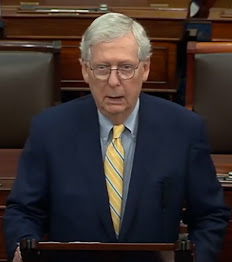McConnell says he has stood with abortion foes from the start

McConnell delivers speech (YouTube image)
—–
Senate Republican Leader Mitch McConnell, who as Jefferson County judge-executive blocked some proposed restrictions on abortion soon after the Roe v. Wade decision, said in a speech Monday that he had always stood with opponents of abortion — who got the court to overturn the decision last month.
“Millions of Americans spent half a century working, marching, and praying for this landmark day, McConnell said in a speech on the Senate floor. “It has been my honor to stand with them throughout the journey that led to June 24, 2022, and to continue to stand together.”
McConnell said the decision in Dobbs v. Jackson Women’s Health Organization “corrected one of the most egregious legal and moral mistakes of the 20th century. “Only seven countries in the entire world allow elective abortion on demand past 20 weeks, but until two weeks ago, past Supreme Courts had mistakenly decreed that the Constitution forced America to be one of them. . . . There is nothing in the Constitution that forces us to be a radical global outlier on abortion. The American people finally have their freedom back to enact common-sense protections for unborn life.”
McConnell, a lawyer, cited some liberal legal experts who have said Roe v. Wade‘s 1973 creation of a right to an abortion, based on implied privacy rights in the Constitution, was not well grounded.
“I don’t think dismantling of women’s reproductive rights was somehow a goal of Mitch’s from the beginning,” Loving told The Courier Journal, adding that McConnell stymied some proposed abortion restrictions as a Jefferson County official in the late 1970s. “I think it was a consequence of choices he made along the way, in terms of appeasing the individuals and organizations who supported his campaign because it was part of their agenda.”
In 1976, the national Republican Party platform endorsed “a constitutional amendment to restore protection of the right to life for unborn children” but acknowledged that many Republicans thought otherwise. In 1980, the platform noted “differing views on this question among Americans in general” but again endorsed the amendment, which would have overturned Roe v. Wade but had no chance of approval in the required three-fourths of states. In 1984, it dropped the equivocation and urged “appointment of judges at all levels of the judiciary who respect traditional family values and the sanctity of innocent human life.”
“We’re going to do it when we want to,” McConnell said in a Senate floor speech. “And when we want to is going to be when the president, whoever he may be, sends up somebody we don’t like.”